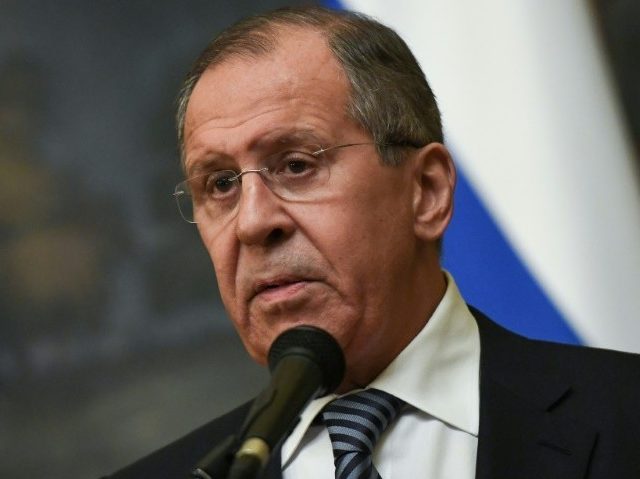North Korean media reported on Wednesday that Russian Foreign Minister Sergei Lavrov will “soon” visit Pyongyang for a meeting with North Korean Foreign Minister Ri Yong-ho. The Russian Foreign Ministry subsequently announced that Lavrov would make the trip on Thursday, following up on an invitation Ri issued in early April.
The intention clearly seems to be for Lavrov to consult with Ri before President Donald Trump and North Korean dictator Kim Jong-un meet in a few weeks, assuming the summit proceeds as planned. Russia and China are both scrambling to demonstrate they retain influence with North Korea and will be important players in any denuclearization agreement that might be reached between Trump and Kim.
Lavrov told Russia’s TASS news service on Wednesday that it will be “very useful for me to understand how our North Korean neighbors relate to all issues” as diplomacy with the United States unfolds. He may also seek to arrange a summit between Kim Jong-un and Russian President Vladimir Putin, an idea he has proposed in the past.
“In accordance with the logic that this mechanism is based on, we support the current changes in relations between the two Korean states, as well as between Pyongyang and Washington,” Lavrov said as he prepared to depart for Pyongyang.
“We very much expect that the planned talks, which have been once again confirmed lately, will not result in ultimatums,” he added.
Lavrov said that denuclearization, by which he meant the entire Korean peninsula rather than just North Korea, could only be accomplished through “step-by-step actions, consistency, and patience.” That is precisely the slow process of payoffs and broken promises the Trump administration wishes to avoid because the North Koreans have so consistently abused it over the past three decades.
“At the final stage of the process, multilateral talks involving all the six countries will become inevitable, which is what the Russian-Chinese road map implies,” he said, making his bid to sustain Russian and Chinese influence over the process.
Putin himself strove to insert Russia into the denuclearization process as a power broker on Friday by suggesting he and President Trump should hold a summit before Trump meets with Kim.
“I think that Russia has felt a bit left out and there are suggestions that President Vladimir Putin wants a summit with Kim,” associated professor James Brown of Temple University told the UK Express on Wednesday.
“It is partly a question of prestige for Russia because they do like to be seen to be involved in international issues, to have that ‘great power’ status, plus they have a fairly strong card that they can play later with the US. If Putin can claim to have influence over Pyongyang, it could be used to his benefit when he wants support elsewhere,” Brown postulated.
The Russians have been seen as alarmed by the possibility that China’s rise as the new superpower rival to the United States will leave Moscow frozen out of Northeast Asia. Russia once enjoyed considerable influence over Pyongyang, purchased at lavish cost. The end of the Cold War and the collapse of the Soviet Union made that game too expensive for Russia to play, so it has lately been wooing the Kim regime by helping it evade the toughest U.N. sanctions and taking advantage of tensions between Beijing and Pyongyang to propose itself as an alternative patron.
A paper from the Australian Strategic Policy Institute in early May argued that in addition to inflating its credentials as a geopolitical heavy hitter and interested power in Northeast Asia, Russia has a very prosaic reason for developing influence with North Korea: it wants a crack at the energy resources that will be made available if Kim Jong-un opens the door to outside developers and investors.
Also, the ASPI notes Russia is keenly interested in sabotaging the confidence of the international community in the power of punitive sanctions, an instrument that is often turned against Moscow. Putin simply cannot afford to let history record that tough sanctions forced concessions from the once-defiant Kim regime, because the same tools might then be used against his own authoritarian and belligerent regime.

COMMENTS
Please let us know if you're having issues with commenting.